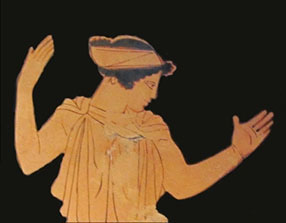
Helen was one of the most important figures in Greek history; her influence on the ancient Greek world cannot be overstated. Before she became a teenager, her exquisite beauty and semi-divine heritage made her the object of wonder and adoration ... by the time she was twenty, thousands of men were willing to fight and die to defend her honor ... by the time she was thirty, she was despised by almost everyone in Greece and Asia Minor. A thousand years after her death, Helen was finally forgiven and now, two thousand years after that, her transformation into a fictional character is regrettably, almost complete.
The immortal gods of Mount Olympos were the actual rulers of ancient Greece. Kings and princes were given their domains with the consent of Zeus, the father of gods and men. When Immortals mated with mortals, demigods were born ... these semi-divine children were superior to mortal men and women but lacked the full-blown supernatural abilities of the gods and goddesses who spawned them. Helen was a demigod. Zeus lusted after a mortal woman named Leda. She was the wife of King Tyndareus of Sparta. With Leda, Zeus fathered twin sons ... Kastor and Polydeukes ... but his divine purpose would not be complete until he and Leda had a daughter ... a very special daughter that would change the political and social landscape of the Greek world. For this special insemination, Zeus came to Leda in the guise of a swan and mated with her, and from that union, Leda became pregnant with Helen.
Leda had a total of five children ... Helen, Kastor, and Polydeukes were fathered by Zeus ... two daughters, Klytemnestra and Timandra, were fathered by Leda's husband, King Tyndareus. Kastor, Polydeukes, and Klytemnestra were born before Helen but the sequence of Timandra's birth is uncertain.
Tyndareus demonstrated remarkable foresight by raising Helen, Kastor and Polydeukes as if they were his own ... he knew they were demigods and that he was an instrument of some divine purpose he did not pretend to understand. He embraced his role as the de facto father of Zeus's children, and his reward for such devotion was a brief and troubled life.
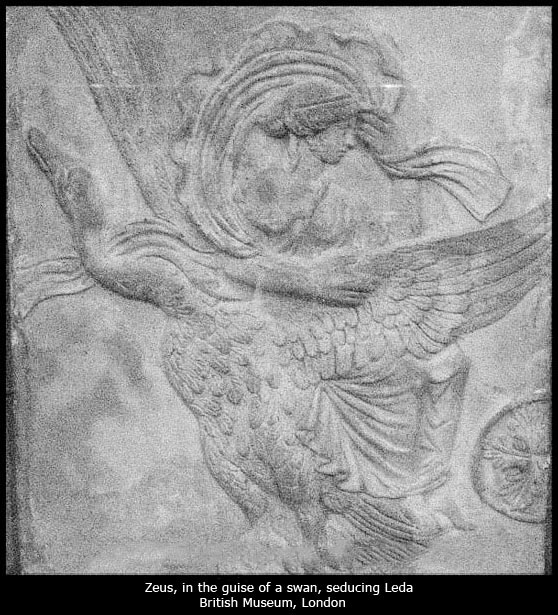
Helen entered the legends and hearts of the Greeks when she was ten years old. While she was dancing in the temple of the goddess Artemis in Sparta, King Peirithoos of the Lapithai and the Athenian hero Theseus became captivated by Helen's youthful beauty. These otherwise noble men kidnapped Helen and fled Sparta with an angry posse in hot pursuit. The scoundrels fled to Athens and drew lots to see who would be allowed to marry Helen ... it was agreed that the winner would help the loser find another wife. Theseus won the draw but was afraid to officially marry Helen because she was so young. He was also afraid to stay in Athens because the Athenians were very displeased with his disreputable behavior. He finally took Helen to the city of Aphidna so that his mother Aithre could hide the girl until she was old enough to marry ... the plan was riddled with flaws, but that was the best he could do under the circumstances.
Helen's brothers Kastor and Polydeukes were relentless in their search for their sister ... they ransacked most of Attika and threatened to attack Athens if the Athenians did not surrender their sister. Finally, a disgruntled Athenian told Kastor and Polydeukes where Helen was hidden. In the process of rescuing Helen, they reduced Aphidna to rubble and took Theseus's mother Aithre as their prisoner. Theseus went into exile and Peirithoos went to an early grave.
One report claims that by the time Helen was rescued, she was pregnant with Theseus's child. She was returned to her family before the child was born, and her sister Klytemnestra, who was already married, was persuaded to raise the child as her own. Helen's child was named Iphigenia. This is repudiated by another report that says Helen was still a virgin when she was returned to her family.
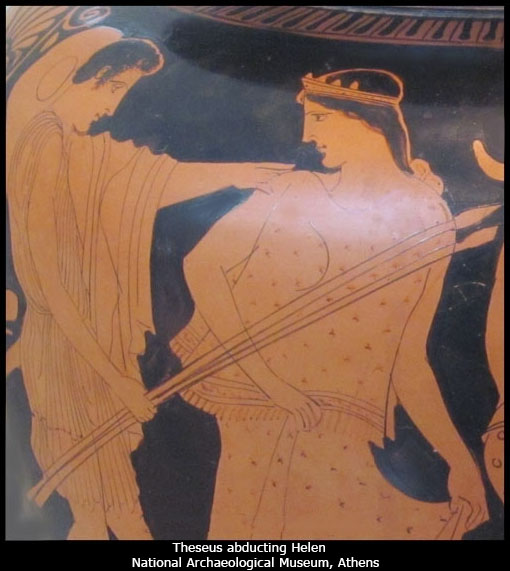
When Helen was finally old enough to marry, Tyndareus was besieged with offers from men of wealth and influence ... kings and princes offered riches in exchange for the privilege of marrying Helen. Tyndareus knew that his daughter had a profound influence on men and unless a way could be found to control the proud men who had assembled at his palace, there would be endless bickering and bloodshed when her husband was finally chosen.
Tyndareus made all the suitors swear a solemn oath that they would accept whichever husband he chose for Helen and, furthermore, they would avenge anyone who tried to take her from her chosen husband. With all the suitors bound by the oath, Helen was allowed to marry a young Mykenaian prince named Menelaos.
Some of the men who wanted to marry Helen were:
Although he was rejected as the husband of Helen, the renowned archer Philoktetes fulfilled the oath he made to King Tyndareus after Helen was kidnapped by Trojan Prince Alexandros (Paris). Philoktetes was bitten by a snake on the way to Troy ... his wound was so severe that his comrades abandoned him on the island of Lemnos where he stayed for ten years. He was finally healed and then rescued by Odysseus so he could fight in the final battle of the Trojan War.
Fear of the Immortals and the indignation of other men caused them to be unsuccessful suitors.
Odysseus never really believed he would be chosen to wed Helen because he knew Menelaos would be chosen. Menelaos sent many gifts to Helen's brothers Kastor and Polydeukes to gain their favor but never went to Sparta to meet Helen. Odysseus was rich and influential but Menelaos and his brother Agamemnon were the most powerful men in Greece.
Iphiklos offered many gifts to King Tyndareus but was rejected.
Protesilaos too offered many gifts to King Tyndareus but was considered to be overbearing and was therefore rejected.
Menestheos came from Athens with many valuable gifts for King Tyndareus. He offered more treasure and gold than any of the other suitors but was rejected.
Lykomedes came from Krete as a suitor and later fought valiantly at Troy for the sake of Helen.
Telamonian Aias came from the island of Salamis with gifts and the promise to gather large numbers of sheep and oxen for King Tyndareus, but he too was rejected.
Elephenor came from the island of Euboia as a suitor of Helen with desire in his heart and many gifts for Helen's father.
Even though Idomeneus was the grandson of King Minos of Krete, he was not allowed to wed Helen.
Eight hundred years after the Catalogue of Women recorded Helen's suitors, the traveler-historian Pausanias (fl. 160 CE) added Patroklos to the list. Patroklos, as the older cousin of Achilles, would have been the right age and linage to be Helen's suitor but the fact that he was not mentioned in the Catalogue of Women seems to discredit his inclusion.
Chosen to be the husband of Helen, Menelaos became king of Sparta after Tyndareus died. In due time, Helen gave birth to a daughter named Hermione ... after that, Zeus and the other Immortals decided to make Helen the focus of a dispute that would give rise to the Trojan War, with its unimaginable glory and atrocities.
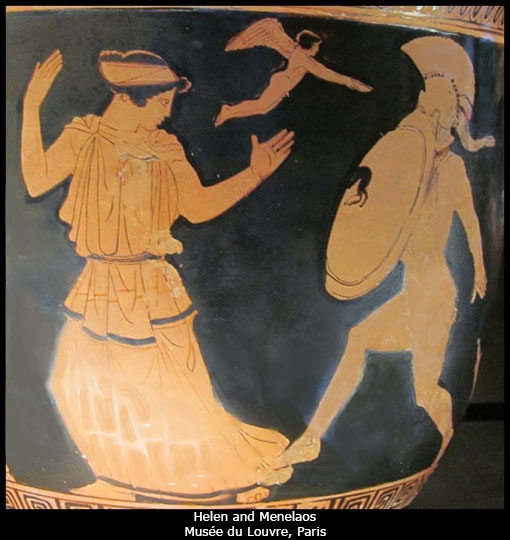
The Trojan War began circa 1250 BCE and was one of the final conflicts inflicted on the human race by the Immortals. The Immortals orchestrated the war and determined its outcome with years of subtle manipulation and direct interference. The first overtures to war took place at the wedding of Thetis and Peleus. Thetis was an immortal daughter of the Ancient of the Sea, Nereus.
Thetis was given to a mortal man named Peleus because of his undying devotion to the gods on Mount Olympos. The wedding of Thetis and Peleus was the setting for a defining event that set the stage for the Trojan War. This event has come to be known as The Judgment of Paris, although at that time it was just another demonstration of the rivalry between the Immortals.
The goddess Hera made sure the wedding was well attended. One of the most notable Immortals at the wedding was the goddess of discord and strife, Eris. She did not come to celebrate ... she came to cause trouble ... she was very good at causing trouble. Eris tossed down a golden apple with the inscription, 'For the most beautiful one.' Zeus's daughter Athene, his wife Hera, and Aphrodite, goddess of love, all assumed that the prize was for them. When the intended conflict arose, Zeus was placed in an awkward position ... someone had to make the decision as to which goddess was the most beautiful. To resolve the dispute, Zeus sent the three obstinate goddesses with the messenger-god Hermes to Mount Ida near Troy. Prince Alexandros, also known as Paris, was chosen to be the judge, and his decision would be final. Even though Alexandros was infrequently called Paris in Greek literature, the artist Peter Paul Rubens immortalized the scene in a painting he named The Judgment of Paris (circa 1635–38 CE) and the name has endured to this day.
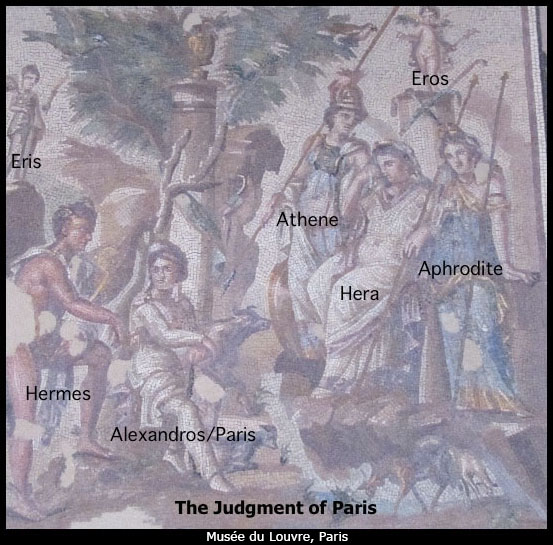
Prince Alexandros had a difficult decision to make. It was common knowledge that the goddess Hera was indeed the most beautiful goddess on Mount Olympos; she was also the most fearsome. Even though Athene was the goddess of wisdom, she was also called the Grim Goddess and the Spoiler ... so he knew attracting her attention could be either beneficial or bloody. As the goddess of love, Aphrodite promised Alexandros the hand of the most desirable woman in Greece ... Helen. He could not refuse such a prize ... with no hesitation, he chose Aphrodite as the most beautiful goddess. Hera and Athene never forgave the insult.
Aphrodite arranged for Alexandros to visit Sparta on the pretext of a trade mission. Menelaos was unaware of the deception, and entertained Alexandros with appropriate hospitality until he was "unexpectedly" called away from Sparta on business. With Menelaos safely out of the way, Aphrodite placed an enchantment on Helen ... she could not resist her attraction to Alexandros ... she gathered her considerable marriage dowry, fled Sparta with Alexandros and sailed for Troy. Theseus's mother Aithre was also taken to Troy to serve as one of Helen's handmaids.
When Menelaos realized he had been robbed of his wife and her dowry, he went to his brother Agamemnon for help in retrieving Helen from the Trojans. Agamemnon was king of Mykenai, which was the most powerful kingdom in Greece. Agamemnon called on the kings and princes who had sworn to protect Helen, and an army was assembled to attack Troy.
An armada of over 1,183 ships with approximately sixty thousand men set sail from Akhaia for Troy. The Trojans called on their allies to help protect the city and were waiting for the Achaian Greeks when the first ships arrived. Protesilaos, the first Greek soldier to set foot on the beach at Troy, was immediately killed by Trojan Prince Hektor. The war continued for nine years without either side achieving a decisive victory.
The Iliad is the story of the last year of the ten-year siege of Troy. Helen lived with Alexandros as his wife during the siege. When the Trojan elders met to decide Helen's fate, several men urged King Priam to surrender her and her dowry to end the war. The majority of Priam's advisors and Trojan elders saw Helen as the incarnation of divine beauty and sincerely believed no price was too high to pay for her continued presence at Troy. King Priam decided to support his son's claim to Helen and the war continued. Although these negotiations appeared to be sincere attempts to end the war, the doom of Troy was decreed from Mount Olympos and there was nothing Priam or Agamemnon could do to change that divine fate.
After ten years of carnage, Alexandros thought he could end the suffering of the besieged Trojans by fighting one-on-one with Helen's Spartan husband, Menelaos. The two armies called a truce and took solemn oaths stipulating that if Alexandros defeated Menelaos, the Greeks would return to their homes and leave Troy unmolested. Likewise, if Menelaos defeated Alexandros, the Trojans would surrender Helen and her dowry as well as offering a worthy tribute to Agamemnon.
The goddess Iris, in the guise of Helen's sister-in-law Laodike went to Helen and told her of the impending fight. The disguised Iris suggested that Helen go to the city wall and watch as her Trojan husband and her Greek husband fought to the death. Helen went to a tower and watched the two armies as they laid down their arms and took their places to witness the fight between Alexandros and Menelaos.
The Immortals were not actually fighting on the battlefield, but they were engaged in constant meddling. When Menelaos was obviously going to win the fight with Alexandros, Aphrodite swooped down, shrouded Alexandros in a mist, and carried him to the apartment he shared with Helen in the citadel of Troy.
Aphrodite found Helen on a high tower of Troy with the other Trojan women. Assuming a disguise, Aphrodite told Helen to leave the tower and go to Alexandros. Helen recognized Aphrodite's divinity and asked why she was trying to beguile her. She berated the goddess for her meddling and told her to take Alexandros for herself if she cared so much for his happiness. Aphrodite was not accustomed to being questioned or disobeyed by a mortal ... she threatened Helen with her divine hatred if her commands were not obeyed at once. Helen trembled in fear because she realized that her life could in fact get much more painful if she continued to taunt such a powerful goddess. Helen humbly went to Alexandros as she had been ordered and wished that she had been killed at birth because so much misery and suffering had been endured for her sake. Her sorrow did not shorten the war or relieve her guilt.
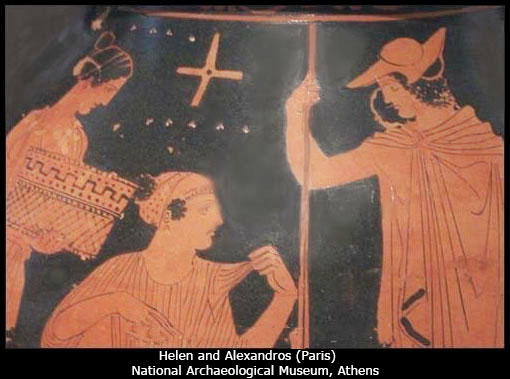
The last bitter days of the Trojan War saw the deaths of Prince Hektor and the greatest warrior of all time, Achilles. With the best warrior in each army dead, the war was destined to go on indefinitely. The Greeks, however, had a brilliant idea. They built a giant Wooden Horse and concealed their best fighters inside. They then took their fleet to a nearby island where they could not be seen by the Trojans. The trick worked ... the Trojans thought the Greeks had finally given up and returned to their homes, and that the Wooden Horse was a peace offering in the form of a tribute to Poseidon, lord of the sea. Over the objections of the seer Laokoon, the Wooden Horse was brought inside the city and became thereafter known as the Trojan Horse.
Helen was suspicious of the Wooden Horse because she knew how cunning the Greeks could be. She walked around the Wooden Horse, and imitating the voices of different men's wives, called out to see if any of the men she suspected to be hiding in the horse would answer. With one exception, all the men hiding inside the horse remained silent ... a soldier named Antiklos almost answered Helen's call, but Odysseus forced him to remain silent by getting Antiklos in a strangle hold. The Trojans began their victory celebration and when all their energies had been spent, and they were relaxing into a wine-induced slumber, the Greeks emerged from the Wooden Horse and the slaughter began.
Troy was a large city, and its toppling was not as organized as we might think. In the confusion, a man named Deiphobos found Helen and hastily married her. When Menelaos found out about the hasty marriage, he killed Deiphobos and was reunited with his long-estranged wife.
The walls of Troy were finally toppled, but by then King Priam and his family were either dead or enslaved. The Greek invaders collected their treasures and slaves, and made preparations to return to their homes. When Helen's handmaid Aithre was brought out of the ruined city, the sons of Theseus asked Agamemnon if they could take possession of their grandmother ... Agamemnon told them that it would be Helen's decision as to Aithre's fate. Helen magnanimously agreed that Aithre had been sufficiently punished for the crimes of her son Theseus and that the old woman should be released into the custody of her grandsons.
Compared to the fate of some of the Greek survivors of the Trojan War, the homecoming of Helen and Menelaos was relatively uneventful. Their ships were blown off course by contrary winds and they made landfall in Egypt before reaching Sparta. They were entertained as the guests of King Polybos and Queen Alkandre of Thebes for an indefinite time. When it came time to leave Egypt, Queen Alkandre presented Helen with a golden distaff and a gold-trimmed silver basket on wheels. King Polybos gave Menelaos two silver bathtubs, a pair of tripods and ten talents of gold (570 pounds or 258.5 kilograms).
Ten years after arriving back at Sparta, Helen and Menelaos were visited by Telemakhos, the son of Odysseus. Menelaos and Odysseus had been close friends during the Trojan War, but Odysseus was unaccounted for ten years after the war. No one knew that Odysseus had offended Poseidon and was still trying to make his way home to the island of Ithaka. Telemakhos was hoping that Menelaos knew the whereabouts of his father. He had gone to Pylos and spoken to King Nestor about his father because Nestor had also been at Troy and was a wise man. After leaving Pylos, Telemakhos was accompanied by one of King Nestor's sons named Peisistratos ... both young men were welcomed by Helen and Menelaos. When he first saw Helen, Telemakhos thought that she looked as divine as the goddess Artemis.
As Menelaos recounted episodes of the Trojan War and the death of Peisistratos's brother Antilokhos, they all began to weep. Helen discretely mixed a calming drug she had acquired in Egypt into the wine they were drinking. The drug worked as prescribed ... Helen, Menelaos and their two guests resumed their composure and were able to cope with their grief without tears.
When Telemakhos and Peisistratos were preparing to leave Sparta, Helen gave Telemakhos a shining robe she had woven herself. She told him that when he found a woman to marry, he should give his bride the robe to wear during the marriage ceremony. In the sky above, Helen and Telemakhos observed an eagle attacking a goose ... Helen knew it was an omen from her father Zeus indicating that Odysseus would eventually return to his home and family. Telemakhos had come to the right place for help.
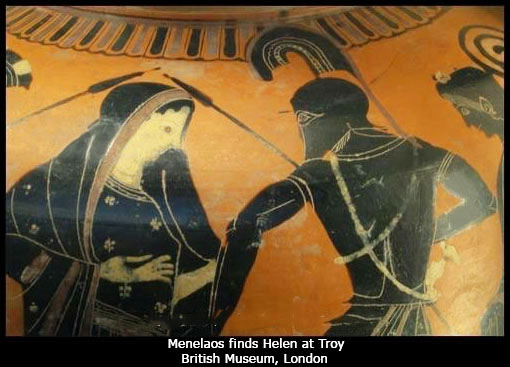
In the Odyssey by Homer, we are told that Helen had one daughter and no sons ... that was because the Immortals decreed that she would have only one child.
When Telemakhos visited Sparta seeking news of his father, he arrived as Helen's daughter Hermione was departing to marry Neoptolemos, the son of Achilles.
Menelaos's son Megapenthes, who was born to a slave-women, was preparing to marry a Spartan woman who was only identified as the daughter of Alektor. Since Hermione was born before Helen left Sparta with Alexandros, she would have been approximately twenty years old when Telemakhos arrived at Sparta.
In The Catalogues of Women and Eoiae, a text written after the Iliad and the Odyssey, we are informed that Helen and Menelaos had a son named Nikostratos who was described as a scion of Ares, god of war. We are also told that Helen and Menelaos had another son named Pleisthenes. After the death of Menelaos, Nikostratos and Megapenthes drove Helen from Sparta to parts unknown.
While at Troy, Helen is reputed to have had a son with Alexandros named Aganos. Using all the available sources, Helen is said to have had four children: Hermione, Nikostratos, Pleisthenes, and Aganos.
The story of Helen and the Trojan War as told in the Iliad and the Odyssey seems to be the final word as to what happened in those distant times but there is another version to the story that needs to be considered.
The historian Herodotus lived circa 484–425 BCE and when he visited Egypt, he was told a completely different story about Helen and the fall of Troy.
Herodotus relates that after fleeing Sparta before the war, Alexandros and Helen did not sail directly to Troy. Contrary winds forced them to Egypt and into the Nile River. There was a shrine to Herakles in that part of Egypt where slaves could seek sanctuary. Alexandros's slaves deserted their master and with the protection afforded by the shrine of Herakles, the slaves denounced Alexandros and told the local governor the circumstances under which Helen had been taken from her home.
When King Proteus of Egypt heard the story, he had Alexandros and Helen brought before him for judgment. When Proteus questioned Alexandros as to how he and Helen came to be in Egypt, Alexandros lied but the slaves revealed the truth to the king. Proteus declared that Helen would be given asylum, but Alexandros would be required to leave Egypt within three days. Alexandros left Egypt and returned to Troy alone. When the Greeks besieged Troy, the Trojans truthfully informed them that Helen was not there, but the Greeks did not believe them until after they had sacked the city and saw the truth for themselves.
Menelaos then went to Egypt and retrieved Helen. When Menelaos and Helen tried to sail from Egypt, they were forced back by uncooperative winds. Menelaos took two Egyptian children and sacrificed them in order to appease the winds. The Egyptians were outraged and chased Menelaos to Libya, but he was able to elude them and secretly return to Sparta.
Herodotus goes on to say that Helen's abduction was not an isolated historical event. The mainland Greeks and the Greeks who had colonized Asia Minor had a long history of kidnapping women from each other.
A generation before the Trojan War, Ieson (Jason), in his Quest for the Golden Fleece, took Princess Medeia from her home in Kolkhis and, according to Herodotus, the failure to return Medeia was one in a series of events used to justify the kidnapping of Helen. Herodotus believed the Immortals allowed the Greeks to destroy Troy in order to punish the Trojans for the foul deeds of Alexandros.
Of course, we are more familiar with Homer's poetic version of Helen's plight. In the Iliad, Helen and Alexandros fled to Troy, and when Menelaos demanded her return, Alexandros refused ... the ten-year Trojan War ensued. After the fall of Troy, Homer tells us, Helen was released from the enchantment of Aphrodite and resumed her marriage with Menelaos.
We cannot be exactly sure when Helen lived and died but we can make assumptions:
Helen was ten years old when Theseus kidnapped her;
Helen might have married Menelaos when she was as young as seventeen;
Helen was married to Menelaos for at least one year before she went to Troy because they had a daughter named Hermione;
Helen was at Troy for ten years before the Greeks arrived, which would make her approximately thirty years old when the war began; the war lasted ten years and Telemakhos saw Helen at Sparta ten years after the end of the Trojan War, which would make her approximately fifty years old at that time.
Using these rough calculations and assuming the Trojan War began circa 1250 BCE, Helen would have been born circa 1270 BCE and lived until sometime after 1210 BCE.
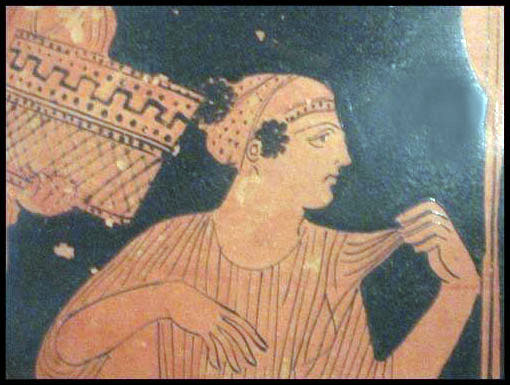
The question has to be asked:
"Was Helen a real woman?"
I have no difficulty in saying emphatically, Yes! Helen was as real as anyone you know. It's easy to forget that many of the characters of so-called Greek Mythology were actually flesh and blood human beings ... some of them were said to have been a mixture of human and divine blood, but they were "real" nonetheless. Characters like Herakles, Ieson (Jason), Theseus, Perseus, Antigone, Achilles, and Helen actually walked on this earth and the stories we read about them are embellished accounts of their glorious and sometimes tragic lives.
For those of us who do not question Helen's reality, another serious question has to be asked:
"Was Helen the most beautiful mortal woman to ever walk the earth?"
Again, I would have to emphatically say, Yes ... absolutely ... there's no question about it! In the ancient world, Helen was not simply known for her beauty ... she was renowned for it! When a woman's beauty or grace was described in ancient poetry, she was either compared to a goddess or to Helen.
Even when the war was turning bad for the Trojans, several of the city's elders saw Helen on the city walls and confided to one another that Helen had the likeness of a goddess and that she was such a lovely vision of womanhood, they did not blame the Trojans or the Achaians for their willingness to endure such woes for her sake.
When I think of legendary feminine beauty, the only other woman who immediately comes to mind is Kleopatra of Egypt. Kleopatra caused turmoil in Rome, the death of Julius Cesar, and the war between Marcus Antony and Octavian. Like Helen, Kleopatra was a Greek.
The rivalries and warfare caused by Kleopatra cannot in any way compare to the loss of human life, toppled empires, personal anguish, and violent atrocities committed for the sake of Helen. Helen was in no way imaginary or ordinary ... she was appreciated for her extraordinary beauty and grace while she was alive, and has been the focus of art and literature for 3,500 years because no woman has ever matched her feminine exquisiteness.
Where's the proof? Very few images of Helen have survived for three reasons:
First, the Trojan War took place circa 1250 BCE ... very few pieces of sophisticated Greek art have survived from that time.
Second, Helen was a Spartan and they were not inclined to indulge in the sort of idolatry that typified many of the other Greek cities. As a Spartan, Helen was loved and honored but she was not the subject of art other than at her shrine in Sparta.
Third, the Athenians of the Classical Age despised Helen ... not because they thought she was the cause of the Trojan War but because she was a Spartan. When the Spartans won the Peloponnesian War, the Athenians used art and theater to denounce their Spartan overlords. To portray Helen as beautiful, feminine or desirable was not possible in the climate of hatred towards Sparta the Athenians indulged. The Athenian poets referred to Helen in a variety of disrespectful and obscene names ... likewise, Athenian artists knew better than to produce an image of Helen for fear of violent retaliation.
There are other aspects of Helen's birth that must be considered. The Kypria states that Helen was the daughter of Zeus and Nemesis, the goddess of divine retribution.
After Helen was born, Nemesis gave the infant to Leda to be suckled and reared. If that is true, that would mean that Helen was not half-mortal but fully immortal. This might explain some aspects of Helen's life, but it seems highly improbable. There is also the speculation that Helen's mother was a daughter of Okeanos (Ocean). This seems highly unlikely and is therefore only given a brief mention. The Nemesis connection seems like a romantic notion, but Helen as the granddaughter of Okeanos does not seem possible.
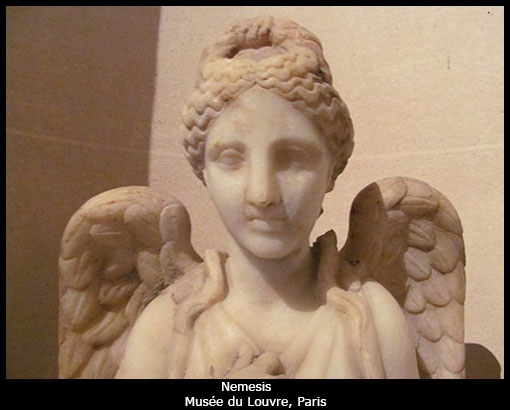
The belief that Leda and King Tyndareus of Sparta raised Helen is essential to the events that served as the foundations of the Trojan War as related in the Iliad. However, having Nemesis as Helen's mother does have a certain symbolic appeal. As the goddess of divine retribution, Nemesis could easily be linked to the theme presented in the Iliad where Zeus is determined to punish the Trojans. With Zeus and Nemesis working together, the Trojans could not fail to understand the source of their troubles. The main problem with that line of reasoning is that Nemesis is not mentioned in the Iliad.
I am including the connections between Helen, Nemesis, and a daughter of Okeanos only because they are part of the surviving literature and, for that reason alone, must be given some consideration.
The traveler-historian Pausanias reported that Menelaos and Helen were buried at Therapne in Lakonia. He also reported that the Rhodians claimed that after Helen was forced to leave Sparta by her sons Nikostratos and Megapenthes, she took refuge on the island of Rhodes where she came under the dominion of Queen Polyxo, the widow of Tlepolemos, a son of Herakles. According to the Rhodians, to avenge the death of her husband Tlepolemos at Troy, Queen Polyxo disguised some women as Furies and had them attack Helen while she was bathing ... she was then hanged from a tree where she presumably died.
The final resting place of Helen is not known. It seems likely that if the location of her grave or tomb had been a matter of public record, it would have been desecrated by those who felt she caused the Trojan War and she was personally responsible for sending so many souls to the House of Hades. Wherever Helen's remains are concealed, may she continue to rest in peace.
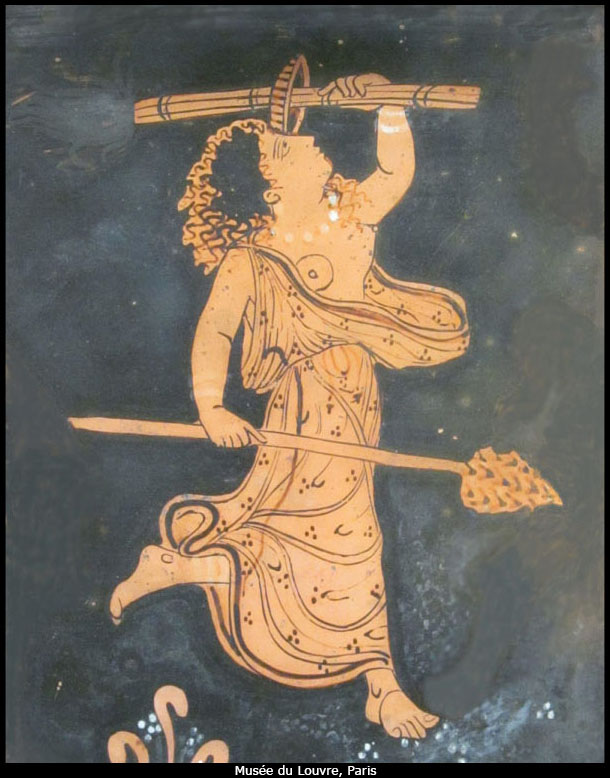
The Iliad by Homer
The Odyssey by Homer
Works and Days by Hesiod
Catalogues of Women and Eoiae
Catalogue of Women by Hesiod
Kypria
Little Iliad
Sack of Ilion
Contest of Homer and Hesiod
The Histories by Herodotos
Description of Greece by Pausanias
Library of History by Diodorus of Sicily